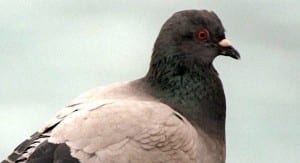 California’s only native pigeon species is taking a big hit from an infectious disease thought to be spread by other pigeons, and the state’s wildlife agency has suggested that bird lovers consider putting away their bird feeders and emptying birdbaths to help slow the spread of the disease.
California’s only native pigeon species is taking a big hit from an infectious disease thought to be spread by other pigeons, and the state’s wildlife agency has suggested that bird lovers consider putting away their bird feeders and emptying birdbaths to help slow the spread of the disease.
Band-tailed pigeons, a close relative of the extinct passenger pigeon, have been falling prey to the disease trichomoniasis for 70 years, but the disease has been taking a larger toll in the last decade, with a rise in deaths in the last two months. The pathogens are thought to be spread to band-tailed pigeons by rock doves, the common introduced pigeon of urban areas, which don’t seem to fall ill when infected.
And as a result, the California Department of Fish and Wildlife is suggesting that Californians in areas with band-tailed pigeon populations remove their bird feeders and empty and clean bird baths, to avoid attracting mixed flocks of rock doves and band-tails.
The band-tailed pigeon, Patagioenas fasciata, lives in groups that tend to inhabit open oak woodlands where they feed on acorns and other fallen tree nuts, a lifestyle not unlike that of the band-tailed’s close cousin the extinct passenger pigeon.
That preference for open forests with oaks means that the birds tend to live in the state’s coastal mountains and the Sierra foothills. If you’re wondering whether the pigeons massing around your feeder are band-taileds or the more prevalent introduced rock doves, look at their beaks and feet: on band-tailed pigeons, those extremities will be yellow. Band-taileds also tend to be larger than rock doves, with a white crescent on the back of their necks, and lacking the wing bars that most rock doves sport.
Also unlike rock doves, band-tailed pigeons reproduce slowly, with each pair producing one chick a year. That, and the birds’ gregarious habit, make them especially susceptible to population declines from diseases such as trichmoniasis. Spread by at least two related protozoa in the Trichomonas genus, the disease causes lesions in the birds’ mouths that interfere with eating and, eventually, breathing. As it takes some time to kill its victims, the disease allows them to transmit pathogens to other birds in the flock rather readily.
Though it’s been known in the California band-tailed population since the World War II era, mass dieoff events from trichomoniasis are on the rise, with six large mortalities in the last decade — including one in Monterey County in 2007 in which an estimated 43,000 birds perished. Mortalities tend to happen during winter, so CDFW’s suggestion of putting your feeder away won’t have to last forever.
The agency is asking members of the public to report dead band-tailed pigeons via the CDFW website or by phone at (916) 358-2790.
If you find a sick pigeon, you can ask one of the state’s wildlife rehabilitation centers for advice.
About Pigeon Patrol:
Pigeon Patrol Products & Services is the leading manufacturer and distributor of bird deterrent (control) products in Canada. Pigeon Patrol products have solved pest bird problems in industrial, commercial, and residential settings since 2000, by using safe and humane bird deterrents with only bird and animal friendly solutions. At Pigeon Patrol, we manufacture and offer a variety of bird deterrents, ranging from Ultra-flex Bird Spikes with UV protection, Bird Netting, 4-S Gel and the best Ultrasonic and audible sound devices on the market today.
Voted Best Canadian wholesaler for Bird Deterrent products four years in a row.
Contact Info: 1- 877– 4– NO-BIRD (www.pigeonpatrol.ca)

